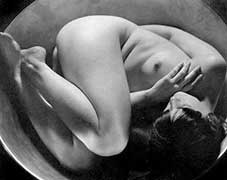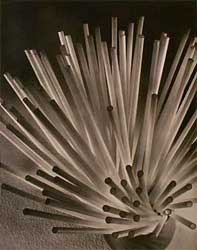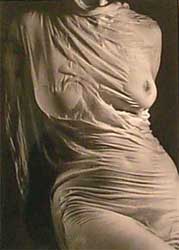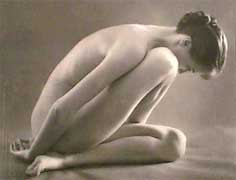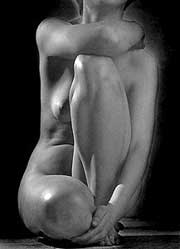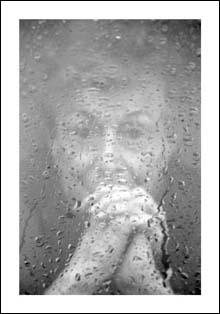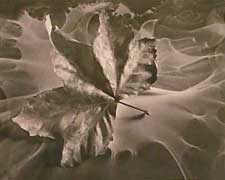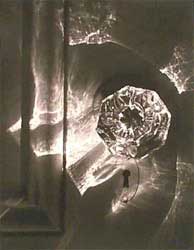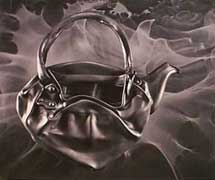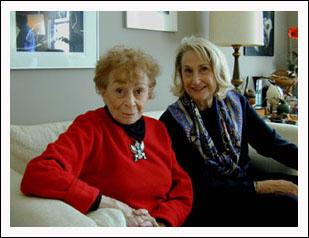|
HAPPY BIRTHDAY RUTH ! Ruth Bernhard turns 100 years old on October 14, 2005 Click here to SEE WIPI MEMBER special tribute to celebrate Ruth, a remarkable person, renown photographer, teacher and inspirational women who's spirit, kindness and humor has brought joy and memorable images to the world of photography. WIPI named Ruth their Distinguished Photographers Awardee in 1984. |
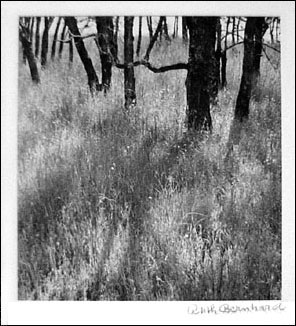 |
Trees
Walking, 1972 Santa Rosa, CA, gelatin silver print,
printed 2002, 11.25" H x 10.25" W, mounted 16x20"
signed and hand signed Santa Rosa, 1972 on back mat
(sold at WIPI / photo la Auction 2003)
|
|
(1905
- ) About the Photographer: Ruth Bernhard was born in Berlin
in 1905. In 1927, after two years at the Berlin Academy of Art, Ruth
moved to New York where she began to seriously pursue a career in photography.
Eight years later she met Edward Weston in California and was deeply
moved by his work. He revealed to her the profound creative potential
of photography and its artistic implications. Desiring to work with
him, she moved to to the West Coast shortly thereafter.
In 1953,
she moved to San Francisco and became a colleague of Ansel Adams,
Imogen Cunningham, Minor White and Wynn Bullock. She has lectured
and conducted master classes throughout the United States through
her 95th birthday. |
|
|
But
she wasn't terribly excited about the position and soon left the magazine's
employ. With her severance pay she bought herself an 8 x 10 viewfinder
camera and with it began taking portraits of her father's friends -
a circle of designers and artisans. From this point she sustained herself
as a freelance photographer while, as well, exploring her own interest
in still life's, fashion, architecture, advertising, etc.
In 1935 Ruth met Edward Weston on a beach in Santa Monica, California. It was a meeting that would transform and elevate her entire perception of photography. "I was unprepared for the experience of seeing his pictures for the first time. It was overwhelming. It was lightning in the darkness ... here before me was indisputable evidence of what I had thought possible - an intensely vital artist whose medium was photography." The mere realization that photography could be Art, in its truest sense, was enlightening. Soon thereafter, Ruth moved to the West Coast to study with Edward Weston in Carmel. Making a living in Carmel proved to be difficult and so she packed her bags for Hollywood where she opened her own studio. Much of her clientele were celebrities who brought in their children to have their portraits taken—many of them posing with their beloved dolls or pets. Then in 1953, she made the move to San Francisco, where she has made her home for the last 47 years. |
|
|
While making a living as a commercial photographer, Ruth
still found the time to devote energy to her personal, creative outlets.
Her nude images of women are some of the most highly regarded within the
breadth of her portfolio. Her visions of the female form are classical
derivates that maintain a vernacular sensuality. Yet it has been even
simpler subjects that have always charmed her heart—from children's
dolls to found shells on the beach shore. Ruth Bernhard's photographs
of these ever common objects exudes a feeling of sentimentality and personal
clause. books Bernhard, Ruth. Edited by James Alinder. Collecting Light: The Photographs of Ruth Bernhard Carmel, CA: Friends of Photography, 1979 Bernhard, Ruth. Gift of the Commonplace Carmel Valley, CA: Woodrose Publications / Center for Photographic Art, 1996 Bernhard, Ruth. Essay by Margaretta K. Mitchell The Eternal Body: A Collection of Fifty Nudes. Carmel, CA: Photography West Graphics, 1986. San Francisco, CA: Chronicle Books, 1994 |
|
|
50 Black
and White Laser Fultone Reproductions
|
|
|
"My
quest, through the magic of light and shadow, is to isolate, to simplify
and to give emphasis to form with the greatest clarity. To indicate
the ideal proportion, to reveal sculptural mass and the dominating spirit
is my goal." Ruth Bernhard
"Light is my inspiration, my paint and brush. It is as vital as the model herself. Profoundly significant, it caresses the essential superlative curves and lines. Light I acknowledge as the energy upon which all life on this planet depends". Ruth Bernhard "For me, the creation of a photograph is experienced as a heightened emotional response, most akin to poetry and music, each image the culmination of a compelling impulse I cannot deny. Whether working with a human figure or a still life, I am deeply aware of my spiritual connection with it. In my life, as in my work, I am motivated by a great yearning for balance and harmony beyond the realm of human experience, reaching for the essence of oneness with the Universe." Ruth Bernhard |
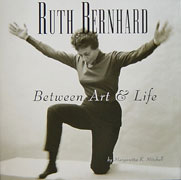 |
Ruth Bernhard: Between Art and Life.
by Margaretta K. Mitchell San Francisco, CA: Chronicle Books, 2000. |
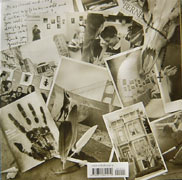 |
Page
135, excerpt: CHRISTINE BURGOYNE, student, 1998 ON RUTH: I registered
a year before April 1998 for the Ruth Bernhard Class in Coupeville,
to assure a seat in the class with this major photographic legend! I
attended to be in the presence of an icon. During the workshop, I felt
slighted by some of Ruth’s criticism of what I was doing. How small
of me! We can all learn and grow if we just open up and do it! I thought
I had been listening to what Ruth had to say, but when my assignment
was criticized, I realized I had not really listened, I had not heard
her intention. Alexander Pope said, "Some people never learn anything,
for this reason, because they understand everything too soon."
Step away from your ego and open up to the possibilities! Thank you,
Ruth!
The story behind the Portrait of Ruth Bernhard (age 94), April 1998 Ruth Bernhard has been a major contributor and influence in the national photographic community but was most appreciated while teaching over the last 8 years at Coupeville Arts Center on Whidbey Island in Washington State. |
|
|
Having
this significant photographic icon so close at hand, I had to enroll
in the last class she would teach at the Arts Center. Knowing that
Ruth limited her class size, I called a year in advance, to assure
getting into this intimate class of only 13. The waiting list ran
off the page as the time drew nearer though! |
|
|
Ruth
Bernhard: "Life gave me presents" By Euan
Kerr Minnesota Public Radio September 3, 2002 http://news.mpr.org/features/200209/02_kerre_bernhard/
excerpts from Radio show, click website link for full story. When people are asked to name the great photographers of the 20th century, Ruth Bernhard is unlikely to come up immediately. However she studied and worked with some of the greats: including Ansel Adams. Now 96, Ruth Bernhard's work encompasses 70 years of American photography. She is particularly recognized for her studies of the female figure. Ansel Adams called her the greatest photographer of the nude. Excerpts
from Minnesota Public Radio interview with Ted Hartwell,
|
|
|
Ted Hartwell delights in telling the story of his
visit to Ruth Bernhard's home in San Francisco.
He's the photography curator at the Minneapolis Institute of Arts (MIA).
He was in her kitchen when a tiny portrait caught his eye. Stuck on
the fridge door, it was a younger Ruth, with her hand up to her cheek.
"Just a small print," he says. "Maybe 2 and a half inches square, signed
by the great Edward Weston. On her refrigerator! Amazing! Amazing! It's
worth a fortune!" The whole Ruth Bernhard story seems studded with tiny
treasures, and happy opportunities
....."I always said 'yes' to everything." There are pictures from that time in the MIA show. There is a formal portrait of an aspiring actress taken in 1929. There is a picture of three kids from Harlem photographed in the early 1930s. Their faces are bursting with excitement at having their picture taken. It was another quirk of fate in 1934 that led her first nude study. She was doing pictures of huge steel bowls for an industrial designer. There were a lot lying round her studio. "I guess they were for hotels, maybe for hotel kitchens or something like that," she says. "So I had a friend who was a dancer and when I photographed those bowls she appeared on the horizon and I said, 'Why don't you get in it?' So it as all very unexpected and lots of fun." Bernhard called the image Embryo. The pale figure of the model is crouched in the bowl against a shadowy background. |
|
|
The
MIA's Ted Hartwell says, like many Bernhard compositions, it can be
understood on many levels. "You know we can read it literally as a figure
in a bowl, a big huge salad bowl or something." Hartwell says perhaps
it's also a recognition of the birth of Bernhard's new artistic direction.
It's a very simple picture, apparently just a moment in time. But it's
carefully posed. Everything exactly in it place. "I am very deliberate,"
Bernhard says. "When I create a pose and there is something about it
I don't like I say 'Let's change it.' So it isn't that I have a lot
of pictures to choose from. I am very stingy with film, maybe?" she
laughs.....
"I was always interested in the shapes. The sexy part never occurred to me." There are dozens of Ruth Bernard's images in the MIA (Minneapolis Institute of Arts ) gallery, the earliest from the late 1920s, all the way through to when she stopped making pictures in the 1970s. |
|
|
Almost
all of them were specially printed for the show. This creates a strange
time warp effect. There are pictures hanging side by side, created decades
apart, but sharing a remarkable similarity. ...
Ted Hartwell puts it down to the strength of Bernhard's artistic vision. He says the work stands out today even in a world awash in images exploiting the human form. "I'd like to believe that Ruth's work serves as a kind of corrective to the kind of flood of banal and quite common imagery that we are beset with," he says. ... "I allowed life to give me presents," she says. "And everything just sort of happened the way it was supposed to happen. I did not pursue anything. It more or less pursued me." Ruth Bernard Photo of Ruth and Margerita by Ted Hartwell, Curator of Photography at The Minneapolis Institute of Arts, recent exhibition on Bernhard at the MIA, August through October 2002 |
| Images
listed starting from top left 1)Early Nude 1934, 2)Straws 1937,
3)Wet Silk 1938, 4)Folding 1962, 5)Classic Torso 1952,
6)Ruth Bernhard, Between Art & Life Book Cover/Back & Book
Design by Lori Barra and Andrew Faulkner, TonBo Designs, 7)Portrait
of Ruth by Christine Burgyone 1998, 8)Leaf 1976, 9 )Doorknob
1976, 10)Tea Pot 1976, 11)Ruth and Margerita by Ted Hartwell,
2002, 12)Perspective II, 1967
books: See Amazon.com Gift of the Commonplace (Lux (Carmel, Calif.), 4.) by Ruth Bernhard Paperback * Publisher: Center for Photographic Art; ; (May 1996) * ISBN: 0963039350 Ruth Bernhard: The Eternal Body: A Collection of Fifty Nudes by Ruth Bernhard (Photographer), Margaretta K. Mitchell Hardcover: 1 pages ; Dimensions (in inches): 11.79 x 0.81 x 12.28 * Publisher: Chronicle Books; ; Reprint edition (November 1994) * ISBN: 0811808262 Ruth Bernhard - Between Art and Life by Ruth Bernhard, Margaretta K. Mitchell Hardcover: 172 pages ; Dimensions (in inches): 0.99 x 9.93 x 10.07 * Publisher: Chronicle Books; ; (October 1, 2000) * ISBN: 0811821919 Information about gallery representation can be found through www.google.com |
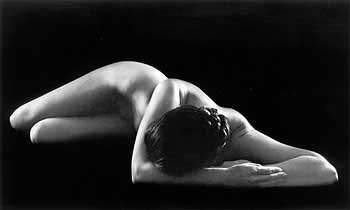
Perspective II
|
WIPI
thanks Ruth for her kind donations to our auctions 2003 and 2004 to
help support the efforts of Women In Photography International. |
|
© copyright 2003 Women In Photography International DISCLAIMER: The WIPI web site presents a wide variety of artistic photographic styles and personalities. Images and/or text content may be perceived differently in various countries or by various age groups. It is the responsibility of the artist, photographer, writer, or company to provide Women In Photography International with copyrighted material. The "contributor" shall hold Women In Photography International harmless from and against any loss, expense, or damage occasioned by any claim, demand, suit or recovery against the "contributor" arising out of the use of the images for the Women In Photography International online web site. |

